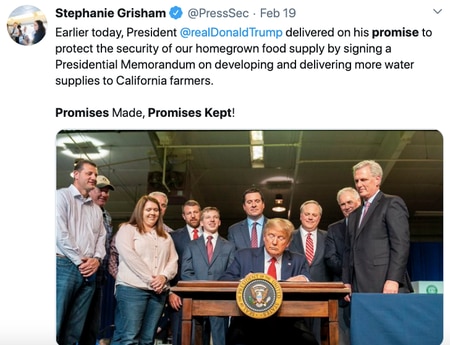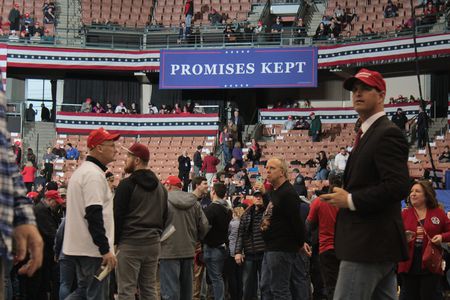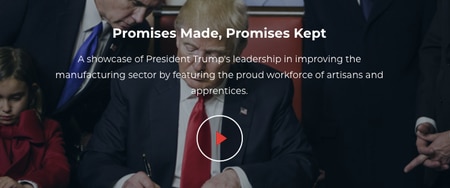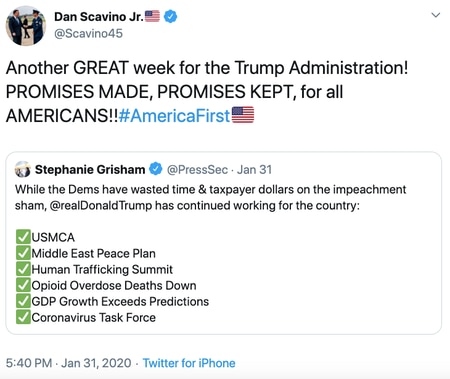Dan Scavino Jr., the White House director of social media, recently mocked former New York City Mayor Michael Bloomberg for “paying millions … for social media influencers and shitty memes,” while President Donald Trump “is paying zero … for EPIC memes” created by an online “Army of American Patriots” who love the U.S. and their president so much, “they don’t need payoffs!”
But the president also pays nothing for the White House social media accounts. While Trump can say what he wants on his personal accounts, federal law and ethics codes make clear that taxpayers should not foot the bill for a politicized social media strategy on government accounts as a president campaigns across the country.
Trump aides, whose salaries are paid by taxpayers, have effectively mounted a political offensive, deploying campaign material and attacks against the Democratic party and presidential candidates from official Twitter, Facebook and Instagram accounts that reach more than 60 million combined followers. The years-long effort — marked by dozens of instances when on-duty Trump aides posted politicized material or outright campaign slogans on official accounts — flies in the face of repeated warnings from federal investigators.
Throughout Trump’s impeachment and Senate trial, the official White House accounts routinely pounded tens of millions of followers with the argument that Democrats on Capitol Hill were liars promulgating a hoax, while the president was a fighter delivering on promises. The material came amid the Trump campaign’s ongoing Facebook and texting blitz, which regularly asked donors to fight back against a “witch hunt.”
Executive branch employees continue to post 2020 campaign slogans such as “Promises made, promises kept,” on official government accounts — even after an independent federal investigative agency warned a senior aide in 2018 that it would consider “such activity to be a willful and knowing violation of the law.”

Screenshot of tweet from Stephanie Grisham, White House press secretary, including the slogan, “Promises made, promises kept.”
“They just don’t care,” Nick Schwellenbach, a senior investigator with the Project on Government Oversight (POGO), a nonpartisan watchdog group, said in an interview. “Within the White House in particular, there seems to be a widespread disregard for the Hatch Act,” the federal law barring on-duty executive branch employees from politicking.
The Hatch Act covers most executive branch employees except for the president and vice president. The 1939 legislation prohibits on-duty employees from engaging in political activity “directed at the success or failure” of a political party or candidate. The law does not apply to members of Congress.
The Office of Special Counsel, the independent federal agency that investigates Hatch Act complaints, says political activity includes using “any email account or social media to distribute, send, or forward content that advocates for or against” a party or a candidate.
The politically-tinged posts from taxpayer-backed accounts reach 20 million followers on Twitter and 9 million on Facebook, before sparking thousands of reactions, shares and comments. Twenty-eight million people follow the official @POTUS account, which almost exclusively retweets the president’s personal account, as well as @WhiteHouse. More than 5.5 million people follow the White House on Instagram, with many posts gaining hundreds of thousands of views and likes.
“It might seem like a small thing, but it’s not,” Schwellenbach said. “The way people consume information has changed so much.”
Donald Sherman, deputy director of Citizens for Responsibility and Ethics in Washington (CREW), said in an interview that it’s fair game for an administration to use social media to point out successes or policy differences. “But federal resources, and the authority of the federal government, should not be used in a way that influences partisan electoral politics,” he said.
The White House did not answer when asked which employees directly manage the official social media accounts. But the accounts are ultimately overseen by administration aides who work for taxpayers, not Trump or his campaign.
The nearly three dozen White House personnel who deal with digital, the press and communications averaged about $104,000 in earnings, according to an annual salary report last June. Several press assistants and digital coordinators earned less than $50,000, but many top digital and communications aides earned six figures, with more than a dozen earning between $120,000 and $183,000.
Hatch Act violations can lead to a reprimand, demotion, suspension or ban from federal work for up to five years or a civil penalty up to $1,000.
OSC’s “career Hatch Act professionals investigate complaints and if a violation is found” that warrants discipline, the OSC seeks action through a settlement or order of the U.S. Merit Systems Protection Board, said Zachary Kurz, OSC communications director.
Almost a dozen Trump administration officials, including Scavino and White House Press Secretary Stephanie Grisham, have already been warned or found in violation of the Hatch Act, some for tweeting campaign slogans, or even simply the popular hashtag, “#MAGA,” an acronym for the president’s 2016 slogan.
Retweeting research conducted by the Republican National Committee, or retweeting the president’s endorsement of a candidate, also prompted OSC to issue warnings to Trump administration officials for Hatch Act violations.
Schwellenbach said that, for decades — irrespective of ethics codes and federal election laws — fear that an opposition party would exert undue political influence once in office “helped restrain some of the worst partisan impulses on either side.”
“We’re in power now, but we wouldn’t want the other side of the aisle doing this,” went the thinking, he said. “That argument isn’t carrying much weight these days.”
MassLive exchanged brief emails with a White House communications staffer for this story on Jan. 30 and Feb. 4. But the White House did not respond to several questions regarding its use of social media and compliance with the Hatch Act.
On March 2, MassLive sent the White House a detailed list of questions and requested feedback from Scavino, Grisham and senior counselor to the president, KellyAnne Conway, and received no response. On March 5, a voicemail left with a White House spokesman went unreturned.
The Trump campaign, Republican National Committee and Democratic National Committee did not respond to requests for comment.

President Trump and the GOP have adopted the slogan, “Promises Made, Promises Kept.” Here, the slogan hangs from Southern New Hampshire University arena during a Feb. 10, 2020 re-election campaign rally.
Turning the White House into a 2020 Campaign Megaphone
The president often boasts about keeping his promises.
“Unlike so many who came before me, I keep my promises,” Trump told both houses of Congress and the American people during his State of the Union address in February, with Speaker Nancy Pelosi shaking her head and smirking behind him.
Trump has turned delivering on the promise of “Keeping America Great” into the cornerstone of his 2020 campaign. Both Trump and the GOP have adopted “Promises Made, Promises Kept” as a slogan.
A video highlighting Trump’s actions in office, titled “Promises Made, Promises Kept” is featured prominently on the official campaign website, donaldjtrump.com. Another website, promiseskept.com, is funded by Donald J. Trump for President, Inc., and touts Trump’s accomplishments.

Screenshot from the president’s re-election campaign website including the slogan, “Promises made, promises kept.”
In 2018, Trump referenced “PROMISES MADE PROMISES KEPT” as his “campaign slogan” in a tweet accusing New York City Mayor Bill DeBlasio of hijacking it. “Not nice at all. No imagination!” the president tweeted.
The Republican National Committee website, GOP.com, offers links to a series of blogs featuring the same slogan.
“As President Trump gets ready to take the stage in Orlando, Florida, tonight to officially launch his 2020 re-election bid, his ‘Promises Made, Promises Kept’ record speaks for itself,” opens a GOP.com blog. The post focuses on low unemployment, business tax cuts and border enforcement as examples of Trump delivering on his 2016 promise to “Make America Great Again.”
The @GOP Twitter account, with 2 million followers, has tweeted some variation of “Promises Made, Promises Kept” at least 60 times since 2017, often with graphics and photos similar to the @WhiteHouse account. The slogan is also popular on the GOP Facebook account, which reaches another 2 million followers.
In March 2018, a week after Trump officially announced his 2020 campaign, OSC issued a guidance warning federal employees they could not wear, display, or distribute items with slogans and materials from the 2016 and 2020 campaigns.
But the taxpayer-funded White House social media accounts continue to fall in line behind Trump’s re-election effort, openly sharing campaign slogans with Twitter, Facebook and Instagram followers more than a dozen times over the last two years.
On the White House Twitter account alone, the president’s social media staffers have tweeted about Trump delivering on campaign promises at least 75 times since 2017.
The same team has specifically posted “promise kept” or “promises kept” from @WhiteHouse at least 15 times combined since August 2018.
In posts on Jan. 29, 2020, the White House Instagram, Facebook and Twitter accounts celebrated the United States-Mexico-Canada trade agreement with posts including “Promise made, promise kept.”
On Dec 10, 2019, the White House Facebook and Twitter accounts posted a video highlighting Trump’s longstanding critiques of the North American Free Trade Agreement. The video shows Trump signing the USMCA and, later, with sweeping background music, receiving applause from workers under an American flag. The video closes with a graphic of the slogan “Promises made, promises kept” swooping over the fist-pumping president.
In September 2018, OSC wrote to CREW, the watchdog group, confirming that it found Grisham in violation of the Hatch Act for including “#MAGA” in a tweet on her official account, The Washington Post reported.
“Tweeting a campaign slogan of a current candidate for partisan political office constitutes political activity for purposes of the Hatch Act,” OSC wrote in the letter. CREW had filed a complaint about Grisham’s #MAGA tweet, which OSC said she deleted once she became aware it broke federal law.
Asked about the White House using social media to consistently celebrate Trump as the president ramps up his re-election bid, Kurz of OSC said that he “cannot comment on your observations.”
But he did provide a link for anyone who wishes to submit a Hatch Act complaint.
“OSC does not typically comment on or confirm specific Hatch Act investigations,” Kurz said when asked if the agency had received complaints about the official White House pages in recent months. “Once an investigation is complete, a letter with OSC’s findings is sent to only the subject of the complaint and to the complainant.”
Schwellenbach said that executive branch officials are “allowed under the Hatch Act to talk about the administration’s policy positions and what they deem successes.”
The Hatch Act makes clear that, per the First Amendment, “you can’t tell someone that just because you’re a high level employee, you can’t have an opinion. But you have to keep things clean” when acting in an official capacity, he noted.
“When you start using the exact same words of a campaign — ‘Make America Great Again’ or ‘Promises Made, Promises Kept’ — it either can violate the Hatch Act or comes so close, it’s not advisable at all,” he added.
Schwellenbach, who previously served as OSC communications director under the Obama administration and, for a short time, the Trump administration, said “it’s amazing” what people do “on the clock” with the ease of access to social media on a smartphone or computer.
He acknowledged that officials like Grisham in particular are “in a tough spot. Anyone who’s press secretary … you’re speaking for the president, trying to defend the administration.”
While the current administration has favored using social media and news interviews instead of press briefings, Schwellenbach noted that OSC trained previous press secretaries to pivot when they fielded a question about an opponent, to essentially say, “’Look, I’m not going to talk about the campaign, but I will talk about the administration believing in this policy.’ But sprinkling in these little campaign slogans … is an obvious attempt to intertwine the campaign into it.”
Not long after OSC concluded Grisham violated the Hatch Act in 2018 by tweeting “#MAGA,” she included “Promise made, promise kept” in an Oct. 1, 2018, tweet. She tweeted the same thing again on Sept. 18, 2019 and Jan. 15, 2020. She also posted “Promises made, promises kept” in tweets two days in a row last month.
Scavino, described in a New York Times Magazine profile as “The Man Behind the President’s Tweets,” quoted a Grisham tweet on Jan. 31 on his official account, and tacked on the 2020 Trump campaign slogan — in all caps.
“Another GREAT week for the Trump Administration! PROMISES MADE, PROMISES KEPT, for all AMERICANS!!” Scavino wrote.

Screenshot of a Jan. 31, 2020, tweet by Dan Scavino, Jr., the White House director of social media, in which Scavino uses a Trump campaign slogan, “Promises Made, Promises Kept,” despite the Office of Special Counsel previously finding other administrations in violation of federal law for engaging in political activity while on duty.
Sherman, an attorney who started his Capitol Hill career as counsel for the House Ethics Committee, argued the Trump administration “is an outlier in several respects, including the number of officials found in violation (of the Hatch Act), and also a general lack of accountability.”
Last summer, after OSC unprecedentedly recommended the firing of a White House official, Kellyanne Conway, for allegedly brazen violations of the Hatch Act, the president told Fox News the law “doesn’t sound fair,” Politico reported.
“No, I’m not going to fire her,” Trump said. “I think she’s a tremendous person, tremendous spokesperson. They have tried to take away her speech, and I think you’re entitled to free speech in the country.”
CREW sued OSC in December seeking to compel discipline for Conway.
According to an OSC letter to Trump last June, Conway’s actions, including using official media appearances and her Twitter account to advocate for the president’s re-election and deride Democrats, “erode the principle foundation of our democratic system — the rule of law.”
“Let me know when the jail sentence starts,” Conway once “flippantly” told a reporter asking about Hatch Act violations, the OSC wrote.
The official White House social media accounts have not faced direct public critique by OSC, however.
CREW, which has sued the Trump administration over a range of ethics and corruption issues, has not filed Hatch Act complaints about the White House accounts in particular.
“The challenge with the White House accounts is, it’s hard to investigate who tweeted a particular statement, and the White House has been less than cooperative with law enforcement,” Sherman said.
Schwellenbach argued that regardless of who’s managing the White House accounts, it’s even more vital that they “be viewed as politically neutral and straight-shooting” because they come “from the institution” as opposed to an individual aide or cabinet member.
“As a taxpayer worried about the polarization of institutions in our government, which should serve us all equally and administer the laws equally — that’s more concerning,” he said.
‘You need to do the right thing’
A few senior officials in the Obama and Bush administrations were also found in violation of the Hatch Act.
The OSC found Julian Castro, President Barack Obama’s Housing and Urban Development secretary, in violation for expressing a personal political opinion in response to a question on the 2016 election. Castro, an eventual 2020 presidential candidate who dropped out in January and threw his support behind Massachusetts Sen. Elizabeth Warren, issued a response acknowledging the error, saying he “tasked the executive team with enhancing training of the act’s requirements.”
A search of White House tweets during Obama’s two terms in office shows posts including the slogan, “Yes we can,” about a dozen times.
Four of those tweets were from his last days in office, with a few quoting his farewell address. Others quoted speeches at Howard University in 2016 and Selma, Alabama, in 2015. Only one came while he was up for re-election, quoting a 2011 speech to graduates of Booker T. Washington High School.
Schwellenbach argued the White House under Obama “should have done more to hold these officials accountable.”
But he credited the Obama White House “for trying to get the message out” on the Hatch Act.
In 2016, the White House Counsel’s Office held meetings with cabinet secretaries to say, “’Look, this is an election year. You need to do the right thing,'” Schwellenbach said.
Schwellenbach emphasized that “Trump can do what he wants” on his own accounts, but he urged the White House to “slow things down” and vet social media posts through the White House Counsel’s office.
“It’s a tough recommendation in the fast-moving social media age,” he said. “But if they were serious about compliance, they would probably do that.”
Asked if any lawmakers have pushed to strengthen the Hatch Act, Kurz said to the best of his knowledge, “there have been no formal legislative proposals” to reform the law since it was modernized in 2012.
‘In the public’s interest’
Facebook users agree not to do anything unlawful on the platform, per the social network’s terms of service.
Twitter’s rules make clear that, “You may not use our service for any unlawful purpose or in furtherance of illegal activities.” The company says it works with government officials on how best to use their accounts.
Facebook, in a pair of emails, did not provide on the record comments for this story.
The company has come under scrutiny for its policy of refusing to remove misleading political ads, even at a time when intelligence agencies have warned of increasing attempts to interfere with U.S. elections. The New York Times recently reported that Facebook did, however, remove misleading Trump campaign ads the company said could confuse people about the 2020 census.
Twitter, in an email, declined to comment on the record. Twitter decided last year to ban political advertising. Twitter also recently added a reporting tool for users who suspect attempts of voter suppression through misinformation.
Neither company responded to questions on potential suspensions or deactivations of accounts in connection with the Hatch Act or related matters. Nor did they say whether they had concerns about social media being used as a political messaging arm through official government accounts funded by taxpayers.
In a blog explaining notices on tweets that may violate Twitter’s rules but remain on the site “in the public’s interest,” the company last year said that “government officials and political figures … have outsized influence and sometimes say things that could be considered controversial or invite debate and discussion. A critical function of our service is providing a place where people can openly and publicly respond to their leaders and hold them accountable.”
“Over time, public interest and how it’s defined on Twitter may change as we observe different types of behavior,” the company added. “We’ll continue to evaluate how our rules and enforcement actions can be clearer and keep working to make our decision-making easier to understand.”
Sherman said he was unaware of any government official ever being suspended from a social media site for Hatch Act or related violations. He added that White House social media managers, and Trump himself, should be wary of violating other laws, including the Whistleblower Protection Act.
Schwellenbach said a social media post defying the Whistleblower Protection Act may violate social media sites’ terms of service, and he could envision the platforms warning or banning accounts for such a post.
But social media posts that flirt with violating the Hatch Act are trickier for government officials and private companies to handle.
Unlike statutes that protect whistleblowers from retaliation or witnesses from intimidation, a Hatch Act violation typically doesn’t have have a direct victim, making it less likely that a social media company would act on a potential breach of the law at the risk of infringing someone’s free speech.
Schwellenbach also noted Facebook or Twitter were unlikely to make the determination on their own that a post violated a 1939 law that was by no means “written for today’s environment.”
